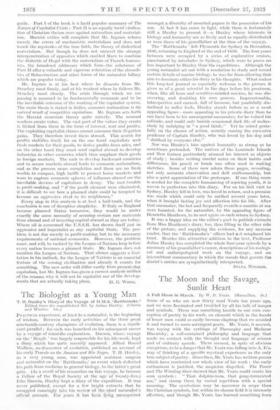The .Biologist as a Young Man .
• PnAertcs.i. experience, at least to a naturalist, is the beginning of wisdom. Between the early activities of the three great nineteenth-century champions of evolution, there is a signifi- cant parallel ; for each was launched on his subsequent career by a voyage of Scientific exploration. , Darwin, whose voyage on the 'Beagle ' was largely responsible for his life-work, kept a diary which has quite recently appeared. Alfred Russel Wallace, co-discoverer of evolution, published an account of his early Travels on the Amazon and Rio Negro. T. H. Huxley, as a very young man, was appointed assistant surgeon and naturalist on the 'Rattlesnake,' an event which deflected his path from medicine to general biology, to the latter's great gain. (As a result of his researches on this voyage, he became a Fellow of the Royal Society at the age of twenty-five.) Like Darwin, Huxley kept a diary of the expedition. It was !lever. published, except for a few bright extracts that he smuggled cunningly into his review of the .chief naturalist's official account. For years it has' been lying unsuspected
amongst,adiversity of unsorted papers in the possessipn of his son. At last it has come to light, while there is fortunately
still a Huxley to present Huxley whose . interests in biology and humanity are as lively and as equally-distributed as were those of his grandfather at the time of the voyage: The ' Rattlesnake ' left Plymouth for Sydney in December, 1846, returning to England at the end of 1850.. The four ,years between were occupied by a aeries of explorative cruises; punctuated by interludes in Sydney, which were to prove no less important to Huxley than the expeditions. Although the young naturalist set out with a resolution to study and record certain details of marine biology, he was far from allowing that aim to dominate either his diary Or his thoughts. What makes this long-lost journal so especially welcome is the picture it gives us of a great scientist in the days before his greatness, when, like all keen and, sensitive-minded, novices, he was dis- covering, .and doubting his own powers. Impressionable; introspective and earnest, fall of humour, but youthfully dis- inclined to suffer fools, Huxley stands before us -as a most appealing figure—more appealing, in his private diary than he can have been to his uncongenial messmates, for he valued his solitude, and could only banish occasional dark fits of melan- choly by indulging in "a good think." Yet he seized grate- fully on the chance of action, secretly cursing the excessive prudence of Captain Stanley, who was loved by his dog and " disliked by everyone else."
. Nor was Huxley's bias against humanity so strong as he sometimes pretended. The natives of the Louisiade Islands and New Guinea particularly aroused his interest as objects of study ; besides writing careful notes on their habits and differences, his pencil or brush was often used in making sketches. Some of these now adorn these pages, revealing, not only accurate observation and deft craftsmanship, but also a quiet appreciation of the grotesque. If one thing more is needed for the complete humanising of aspiring youth, it is woven to perfection into this diary. For on his firh visit to Sydney, Huxley fell in love, was loved in return, and a promise was made which could only be ratified several years later, when it brought lasting joy and affection into his life. After. that encounter, the hot and frequently eventle :s months at sea were haunted, for the naturalist, by the appealing figure of Henrietta Heathorn, to be met again on each return to Sydney: It was a happy idea on the editor's part to publish extracts from Miss Heathorn's diary, too, thus filling in the other aide of the picture, and supplying the evidence, for any anxious reader, that the Rattlesnake's ' officer had n yt misplaced his trust. Besides this attractive addition to the text, Professor Julian Huxley has completed the whole four-year episode by a summary of his grandfather's career, descriptions of his zoologi- cal and anthropological work on the voyage, and an intermittent scommentary in which the moods that govern the diarist's entries are sympatheticallY interpreted..
SYIVA Nonsrasr,


































 Previous page
Previous page